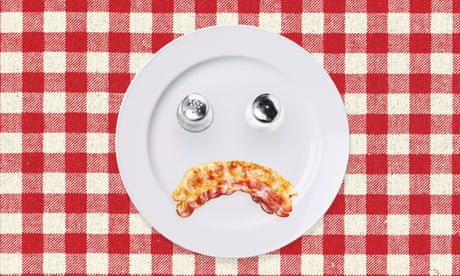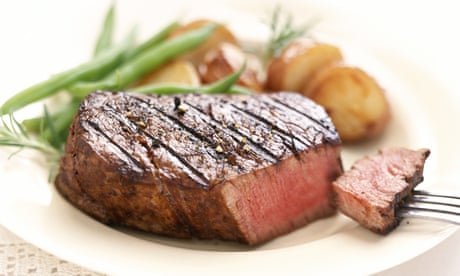Bowel cancer
Even moderate intake of red meat raises cancer risk, study finds
People more or less keeping to NHS guidelines at higher risk than those who eat little
Sarah Boseley
Health editor
Wed 17 Apr 2019

A cooked breakfast with two sausages and two rashers of bacon would constitute 130g.
Photograph: Murdo Macleod/The Guardian
Eating even the moderate amounts of red and processed meat sanctioned by government guidelines increases the likelihood of developing bowel cancer, according to the largest UK study of the risks ever conducted.
The Department of Health and Social Care (DHSC) suggests anyone who eats more than 90g of red or processed meat per day should try to cut down to 70g or less, because of the known link with bowel cancer. The NHS describes90g of red meat as “equivalent to around three thinly cut slices of beef, lamb or pork, where each slice is about the size of half a piece of sliced bread”.
Processed meat includes sausages, bacon and ham. A cooked breakfast with two “typical British” sausages and two rashers of bacon would clock up 130g, the NHS advises.

Yes, bacon really is killing us
A five-year study of half a million men and women who have signed up to the UK Biobank research project found those who were more or less keeping to the guidelines, eating on average 76g of red or processed meat per day, had a 20% increased risk of bowel cancer compared with those who averaged 21g a day.
The risk increased by 20% with each extra slice of ham or rasher of bacon (roughly 25g) the study participants ate, and by 19% with each thick slice of roast beef or the edible part of a lamb cutlet (about 50g).
The study also found heavier drinkers of alcohol had an increased risk – up by 24% among those who drank the most alcohol compared with those who drank the least. Eating fibre in the form of breakfast cereals and bread had a protective effect, however. In January, a study commissioned by the World Health Organization (WHO) reported fibre also protects against heart disease.
Cancer Research UK’s expert in diet and cancer, Prof Tim Key, who co-authored the study and is also deputy director at the University of Oxford’s cancer epidemiology unit, said the research had an extra adjustment to check whether participants had accurately reported what they eat. Diet studies are problematic because those who take part often either forget what they have eaten or fail to tell the truth.
All the Biobank participants were asked about their diet when they joined up. In this study, they were also asked to complete an additional questionnaire every three or four months, detailing exactly what they had eaten in the previous 24 hours.
The researchers found those who ate the most and least red and processed meat tended to exaggerate their consumption or lack thereof. That led to a steeper increase in risk than in studies relied on by the WHO when it produced the guidance incorporated into that of the DHSC.
“We are not claiming that therefore the government recommendation is wrong and should be changed,” Key said. The paper, published in the International Journal of Epidemiology, would have to be seen in the context of many others, he said.
Key also said meat had nutritional benefits. “Meat is important for iron. We would want to consider other aspects of health if we were going to change the recommendation. The main message for the public is that it reinforces the government advice that we shouldn’t eat large amounts of red and processed meat,” he said.
Alcohol, on the other hand, increased bowel cancer risk and did not have nutritional benefits, he said. “Alcohol is an optional thing that we don’t have to consume,” Key added.

Should we give up eating red meat?
Dr Gunter Kuhnle, an associate professor in nutrition and health at Reading University, said the analysis of the link between meat intake and bowel cancer was very thorough and confirmed previous findings about the risks.
“The results of this study also question the recent focus on nitrite as the main culprit for colorectal cancer: the authors found very small differences between red and processed meat in this study, even though only processed meat contains nitrite,” he said.
“A reduction or removal of nitrite from meat products would therefore have only little impact on cancer risk. An increased consumption of fibre, as shown by this study, would be of considerably more benefit.”
Dr Julie Sharp, Cancer Research UK’s head of health information, said: “The government guidelines on red and processed meat are general health advice and this study is a reminder that the more you can cut down beyond this, the more you can lower your chances of developing bowel cancer.”
Bowel cancer
Medical research
Meat
Cancer
Link: https://www.theguardian.com/society/2019/apr/17/even-moderate-intake-of-red-meat-raises-cancer-risk-study-finds?CMP=share_btn_tw
No comments:
Post a Comment